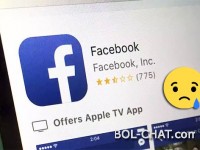GUARDIAN: Facebook now gives readers only paid articles, portals have dramatically decreased their attendance. Croatia, Serbia and Slovakia are the first to strike.
Latest! Facebook relocates post posts outside of the "news feed" in its new experiment, in which some portals have fallen by as much as 60 percent - overnight
The new system could destroy small publishers if it was fully spent after journalists reported a decline in organic content - but users will still see the posts of their friends.
Facebook is testing a major change that will move unpaid posts and posts from "news feeds" (publications whose spread depends on Facebook's algorithms), a move that could be disastrous for publishers who rely on a social networking audience, writes The Guardian.
The new system, which is currently being tested in six countries, including Slovakia, Croatia, Serbia and Sri Lanka, has pushed almost all unpaid posts and posts to "second level announcements", leaving "news feed" focused exclusively on the original content of your friends and paid Articles.
The change was caused by some users of the Facebook page, with a drop in publishing, from 60% to 80%. If this experiment is expanded to other countries, such a change will be destroyed by many smaller publishers, as well as those of a larger publisher who overly rely on social media as a recommendation for visitors.
According to Filip Struhárik, a journalist in the Slovak daily Dennik N, the change resulted in a decline in interactions in the media sector of that country. "The pages see a dramatic decline in the organic reach," Struhárik said. "Reading a few Facebook pages fell on Thursdays and Fridays by two-thirds compared to the previous days."
Overnight, from Wednesday to Thursday, the 60 largest Facebook pages in Slovakia experienced a decline in Facebook releases by as much as two thirds to three quarters, according to analytical statistics of CrowdTangle owned by Facebook.
For larger websites, which have several different ways to communicate with their readers, they did not go to the bottom of reading, but there is already another story for those who rely on social media.
Few pages report loss of traffic and Facebook engagements, Struhárik told Guardian. "It's hard to say how much this will be. Problems also hit pages that are similar to BuzzFeed, which are more dependent on social networking. "
Struhárik noted that Facebook's experiment was conducted only on Thursday, and it seems too early to make strong conclusions. "But if the reach is radically smaller, interactions are reduced and your site has no diversity of sources, and it could hurt."
In a statement, Facebook said: "Through all possible stories on the wall of each person, we always work to connect people with posts that make the most sense. People told us they wanted a simpler way to see friends and family posts, so now two separate "feeds" are being tested, one as a dedicated space with friends and family posts, and even as a dedicated site for publishing Facebook pages. "
Namely, the change does not seem to have affected the paid promotions: they still appear on the "news feed" normally and without interruption, as well as with people who follow or have become friends with the page. However, the change affects the so-called. "Native" content, such as Facebook video materials, if they are posted on the page and do not share through paid promotions.
Matti Littunen, a senior analyst at Enders Analysis, said this move was "a classic Facebook scheme: first give a lot of organic content to one type of content, and then take it away from them that they have to pay the reach and have to pay for their articles through the reach of anyone and read it. "
Littunen says that many "premium" publishers have already learned about this trend, and that they no longer rely heavily on social media. But new media companies, who rely on social media in traffic and revenue, could be wounded, perhaps fatally. "The biggest issue will be hit by the biggest publishers like BuzzFeed, Huffington Post and Business Insider, which create content for the ultimate goal."
Otherwise, publishers who only concentrate on video content on Facebook could also burn, says Littunen.
"We do not see the prosperity on social networks going forever, and since the content is not what interests Facebook, it's a consumable product for him. We expect to see another replay of this scheme, with an organic reach that is replaced by paid posts. "
For Struhárika, there is one last lap: he does not expect the test to be a big success. "News feed without news. Only friends and sponsored content. People will then find out how boring their friends are, "he said.
In a second release published after writing this article, Facebook added: "We do not have current plans to globally implement this scheme."
- 28 Oct, 2017
- 1501 views
- No comments


